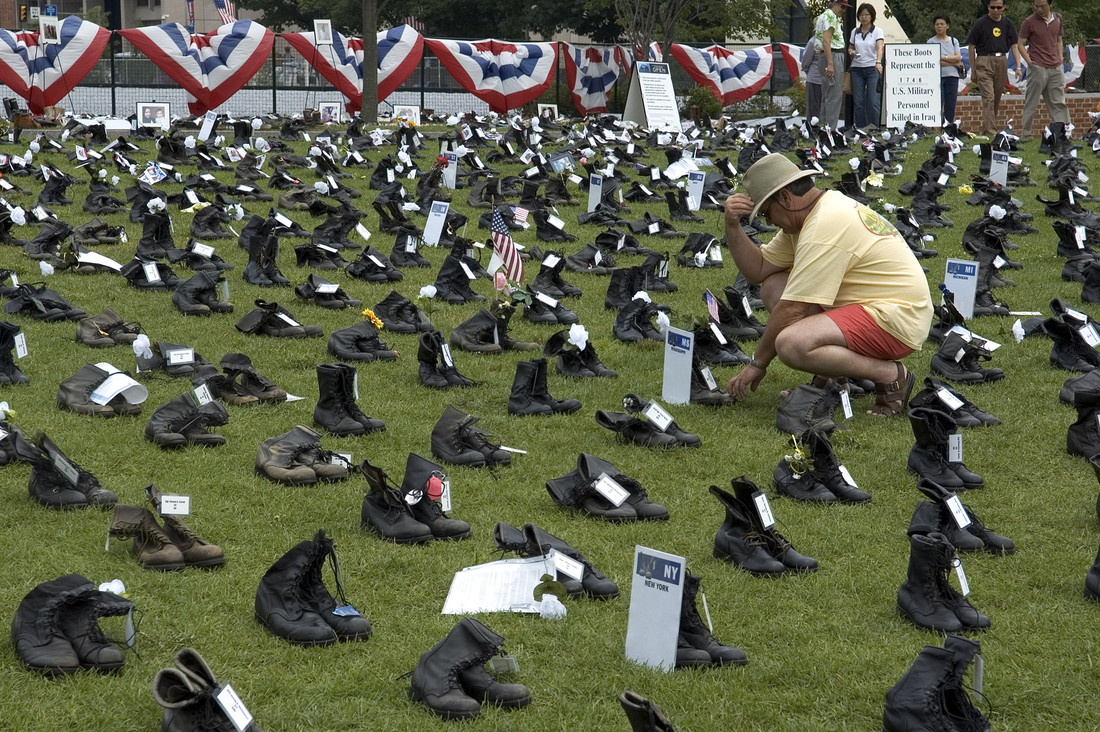
This week marks the 19th anniversary of the attacks of 9/11. Today it’s clearer than ever that decisions made in the aftermath of those actions have led to nearly two decades of war, the loss of countless lives, and increasing restrictions on rights and civil liberties in the U.S. and around the world—and it is long past time for us to change course.
There are many ways to measure the costs of the “war on terror”:
- Since 2001, at least 775,000 people have been killed in locations where the U.S. military is actively engaged (a figure that doesn’t include many killed as a result of the U.S. drone war in places like Libya, Somalia, and Yemen).
- At least 37 million people have been forcibly displaced. Through AFSC’s work in Iraq, Jordan, Somalia, and elsewhere, we’ve seen families torn apart, communities destroyed, and societies fractured in ways that will take generations to repair.
- Between 2001 and 2019, the U.S. spent over $6.4 trillion dollars on wars in Iraq, Afghanistan, Syria, and Pakistan—$2 trillion more than the total federal budget for 2020. Just a fraction of those funds could have offset the impacts of the 2008 financial crisis, provided universal health care for everyone in the U.S., and so much more.
The “war on terror” has continued to allow for the steady deterioration of civil liberties and rights. Since 9/11, Muslims, Arabs, and others from the Middle East were unjustly identified by the U.S. as a threat abroad—and they became suspect at home, leading to widespread police surveillance within Muslim communities, racial profiling, harassment, and entrapment. Today these same tactics are being used to target individuals accused of being associated with Black Lives Matter, Antifa, and other groups.
The Department of Homeland Security (DHS), which was created in the aftermath of 9/11, has used its powers to attack First Amendment rights and terrorize immigrant communities and other groups. As part of DHS, Immigration and Customs Enforcement (ICE) and Customs and Border Protection (CBP) have disappeared people from the street, their workplaces, and their homes—with no respect for basic rights. In recent weeks, the federal government has used similar tactics against people protesting racial injustice, with undercover troops in unmarked vehicles seizing individuals on the street.
At the same time, federal forces have been ordered to quash ongoing political protests around the country, including those opposing the increasing militarization of U.S. police forces, some of which is also a result of post-9/11 policies. These attacks are no different from the brutal use of police violence against protesters for Black Lives Matter, Standing Rock, and others seeking political change over the last decade.
Of course, crackdowns on protesters are not new. Profiling, spying, intimidation, and attacks on racial justice activists replicate abusive programs of the past, like COINTELPRO, that also targeted racial justice as well as anti-war activists—but their reintroduction can be directly linked to post-9/11 laws and policies.
And while the “war on terror” continues to erode our rights and civil liberties, it has done nothing to address what the U.S. considers threats to national and international security.
For too long U.S. decisions and actions have been driven by fear and distrust. It’s time to reckon with the cost of our past actions and create a more just and peaceful path forward. Instead of perpetuating endless wars, we must build a more inclusive view of security that accounts for the well-being of all—ensuring that human needs are met and human dignity is upheld, processes for justice and accountability are fair and available to all, and resilient communities have support to solve problems nonviolently.
We must reverse course on the disastrous policies that advanced amid the climate of fear following 9/11. That includes abolishing ICE and dismantling DHS, ending the dangerous surveillance powers expanded under the Patriot Act, and discontinuing policies that fuel Islamophobia and racism.
We must challenge the “us vs. them” narrative at all levels, from the personal to the global, and demilitarize and depolarize our approaches to public safety. We must expand and deepen the application of restorative justice practices at all levels of society. And we must absolutely shift federal budget priorities to invest in human needs, preventative approaches, and shared infrastructure—instead of war and fear.
Nearly two decades after 9/11, we know that a different future is possible—but only if we choose an alternative path. It isn’t too late.
